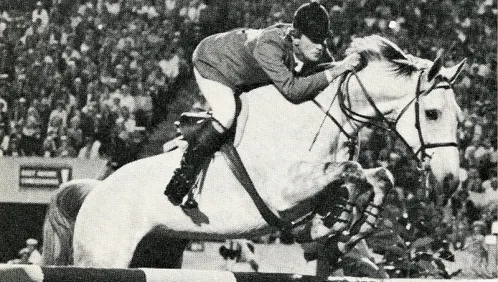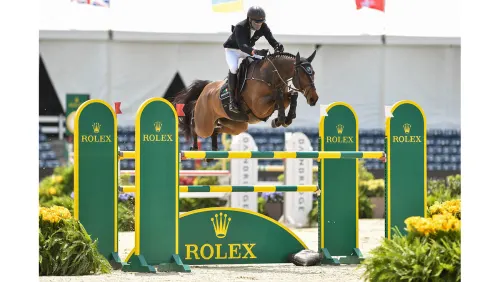Michael Aguilera believes in sweat equity, putting in the time, and starting from the beginning with horses. He believes a horse that feels love, care and respect from you will give you everything in return. And he believes that once horses take a deep hold within you, it’s impossible to let them go, even if you tell yourself otherwise for years.
Aguilera grew up in Southern California in a family where horses were the center of life. His parents ran a boarding facility in Orange County, and he competed in the hunters and jumpers.
Buying accomplished show horses wasn’t in the budget, so Aguilera learned to work with what was available.
“As a kid, our goal was to discover great horses at auctions or from kill buyers,” he said. “We would go to an auction and come back with four horses, and part of it was to sell them and make a little money, but the other part was to find a show jumper.
“One of my best horses was named 137, as we had purchased her at the auction in Norco for $137,” he continued. “They said she could jump, and so we bought her. She was a spectacular jumper, and I once got second in a puissance class with her. She was probably one of the best horses I had ridden at that time.”
Horses filled Aguilera’s life, and he assumed his future career path would lie in that direction. “But when I was 18, my mother decided to get out of the horse business,” he said. “I basically didn’t have the money to continue to do it without a facility and without the horses. With her encouragement, I went to college.”
Aguilera studied sociology at UC Irvine (California) and went on to get a PhD in sociology at Stony Brook University (New York). His experience in the horse world led him to research Mexican migration to the United States.
“I started taking classes in race and ethnicity,” he said. “I was really concerned about the ill-treatment of migrants in the United States, so that was why I went into sociology; it was all about race relations.
“In Southern California Mexican migrants are a big part of horse ranches,” he continued. “I was fascinated with migrants and their migration processes and why they come here and what treatment they get when they’re here. Half of what I do is teaching, and the other half is doing research on Mexican migration to the United States, though I just had an article published about global horse markets, so maybe that’ll be a new area of research for me.”
After grad school, Aguilera and his wife, Zoila Zetino, moved to Eugene, Oregon, where he got a job as an associate professor of sociology at the University of Oregon.
“Teaching is wonderful,” he said. “It’s enjoyable to talk to different students and debate different topics. I love teaching, and the research is wonderful as well because it allows you to answer important sociological questions. It’s a wonderful job.”
ADVERTISEMENT
For more than a decade, Aguilera left horses behind, but he never stopped thinking about them. “It was quite painful to leave the horse world,” he said. “But I didn’t really see that I had any other option. So I went off to college and just continued my life and sort of thought that maybe one day when I had the money I could get back into the horse world.”

Riding is a family affair for Michael Aguilera. Here’s his wife Zoila Zetino and son Nicholas. Photo courtesy of Michael Aguilera.
And when he came across an unbroken Percheron, he started down that path again. “He was advertised as being a wild beast that was unmanageable,” said Aguilera. “But we trained him to ride and even trained him to jump. But we got to the point where we realized he wasn’t really suitable for jumping. After that, because I’d jumped him a little, I got the itch back and decided to start thinking about what I could do to have a jumping horse again. So we picked up some horses at the local auction and trained them to jump as well and just slowly started getting back into it.”
As their collection of horses grew, the next logical step was a farm, and they finally purchased one a year ago.
But he wanted still more.
“I started to watch grand prixs on the internet and realized that many of the people that I rode against as a kid were now professional grand prix riders,” he said. “From Southern California you had Meredith Michaels-Beerbaum, you had Candice King, and a variety of other well-known riders who wound up doing really well, and they were all people I saw every weekend at shows and competed against. I realized that maybe if I’d continued down that road, I might have been a grand prix rider as well.”
Aguilera, now 48, is working hard to make his dream come to fruition. He bought Howard VDL, a Dutch Warmblood gelding (Mr. Blue—Tolivia VDL), in England in 2016 with about 10 rides on him.
Aguilera and the gelding were second at the 5-year-old Young Jumper Championship at the Blenheim Fall Tournament (California) last September.
“He’s like a puppy dog,” said Aguilera. “I took him to a show, and all of these kids were petting him. He just loves cuddles and is pretty friendly.
Aguilera plans to compete Howard in the 6-year-old classes this summer.

Michael Aguilera and his wife Zoila Zetino, with son Nicholas Aguilera as a baby. Photo courtesy of Michael Aguilera.
“We’re really excited because in that division it’s mostly top grand prix riders with their prospects, so it’s a big deal for us to be able to compete at this level,” he said.
Oregon doesn’t have a plethora of jumper shows, so every summer Aguilera and his family make the 20-hour drive to San Diego. There he bases at the ranch he inherited from his mother after she returned to the sport.
ADVERTISEMENT
They compete at Show Park and Blenheim, which are nearby. “As a result of my job, I can only really compete in the summer,” Aguilera said. “In some respects, because we’re training young horses, this is actually good for our schedule because it allows us to train the horses and get them ready to go out and compete.”
Taking care of six horses and farms in two states is a family affair. Aguilera, Zetino and their children, Bridget Canel, 20, and Nicholas Aguilera, 6, all participate.
“Bridget used to show a lot, but she just got a job, so she’s started to show less,” he said. “But one of the horses I have that I was going to sell, she wants to keep. So she’s going to keep riding him, and she’ll have herself a nice little show pony.”
Zetino and Nicholas are also starting to get more involved. “She started to ride and jump one of my older show horses [Pandou VG] and is going to probably be going to her first hunter show in May,” Michael said. “Nicholas may do his first show then as well. He’s been practicing on his little Morgan.”
Michael admits it’s a juggling act to run a farm and have a full-time job.
“[Having the farm] is a huge commitment, but if you want to do it, you have to do the work,” he said.
Thirty years after putting his grand prix dreams on hold, Michael is striving to get there in his own way, on his own terms.
“If I train the horse, I have a bond with the horse that nobody else has,” he said. “And I know that the horse is going to have some loyalty to me and be willing to do things for me that it wouldn’t do for other people. I think that’s what’s sort of lacking in American show jumping now that everybody is outsourcing the labor. They’re losing that bond. I was taught that your horse will perform as well as you take care of them. That when you’re jumping big jumps, there’s going to come a time when your horse is going to have to decide whether you two survive or not on course. And a horse that’s happy and well cared for is going to make the choice to save you.”
It wasn’t until Michael came back to horses that he realized how much they truly meant to him.
“It left a hole in me in the sense that up until that point, all I’d done was ride, and every moment of my time was riding,” he said. “Though my career has been really rewarding, once I got back into horses, I really realized how comfortable I felt on horses, whereas in other parts of my life, I didn’t necessarily feel that comfort. There’s just something really rewarding about having this bond with a horse and being able to train a horse. It’s been so wonderful to be able to feel that bond again. Even if you go and live a different life and act like horses aren’t a part of your life, if you’ve had that background, it’s not really something you can get rid of.
“It seems kind of corny, but for a long time I felt incomplete,” he continued. “And to be able to be on a horse, be it just walking or jumping, I feel complete again. I feel very fortunate that I’m able to get back into it at this age.”















